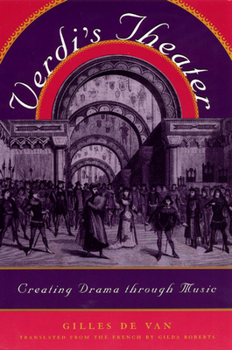Verdi's Theater: Creating Drama Through Music
Select Format
Select Condition 
Book Overview
In this innovative study, Gilles de Van focuses on an often neglected aspect of Verdi's operas: their effectiveness as theater. De Van argues that two main aesthetic conceptions underlie all of Verdi's works: that of the "melodrama" and the "musical drama." In the melodrama the composer relies mainly on dramatic intensity and the rhythm linking various stages of the plot, using exemplary characters and situations. But in the musical drama reality begins to blur, the musical forms lose their excessively neat patterns, and doubt and ambiguity undermine characters and situations, reflecting the crisis of character typical of modernity. Although melodrama tends to dominate Verdi's early work and musical drama his later, both aesthetics are woven into all his operas: musical drama is already present in Ernani (1844), and melodrama is still present in Otello (1887). Indeed, much of the interest and originality of Verdi's operas lies in his adherence to both these contradictory systems, allowing the composer/dramatist to be simultaneously classical and modern, traditionalist and innovator.
Format:Paperback
Language:English
ISBN:0226143708
ISBN13:9780226143705
Release Date:September 1998
Publisher:University of Chicago Press
Length:434 Pages
Weight:1.30 lbs.
Dimensions:0.9" x 6.0" x 8.9"
Customer Reviews
0 rating





